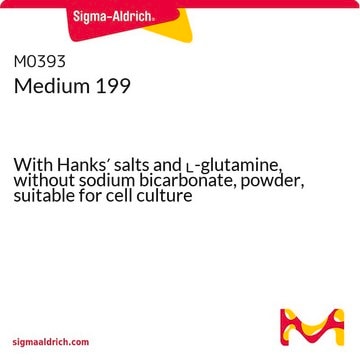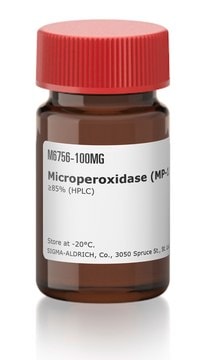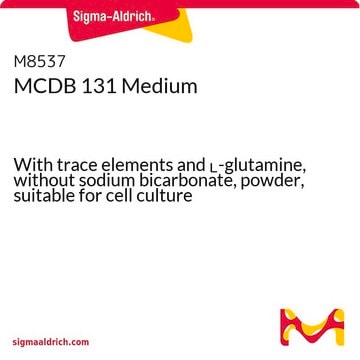M7528
Medium 199
HEPES modification, with Earle′s salts, and sodium bicarbonate, without ʟ-glutamine, liquid, sterile-filtered, suitable for cell culture
Synonyme(s) :
Cell culture medium, M199 Medium, TCM 199
About This Item
Produits recommandés
product name
Medium 199, HEPES Modification, with Earle′s salts, 25 mM HEPES and sodium bicarbonate, without L-glutamine, liquid, sterile-filtered, suitable for cell culture
Niveau de qualité
Stérilité
sterile-filtered
Forme
liquid
Technique(s)
cell culture | mammalian: suitable
Impuretés
endotoxin, tested
pH
>7.2
Composants
L-glutamine: no
sodium pyruvate: no
HEPES: 25 mM
phenol red: yes
NaHCO3: yes
Earle’s salts (5% CO2): yes
Conditions d'expédition
ambient
Température de stockage
2-8°C
Vous recherchez des produits similaires ? Visite Guide de comparaison des produits
Description générale
Reconstitution
Souvent commandé avec ce produit
Code de la classe de stockage
12 - Non Combustible Liquids
Classe de danger pour l'eau (WGK)
WGK 1
Point d'éclair (°F)
Not applicable
Point d'éclair (°C)
Not applicable
Certificats d'analyse (COA)
Recherchez un Certificats d'analyse (COA) en saisissant le numéro de lot du produit. Les numéros de lot figurent sur l'étiquette du produit après les mots "Lot" ou "Batch".
Déjà en possession de ce produit ?
Retrouvez la documentation relative aux produits que vous avez récemment achetés dans la Bibliothèque de documents.
Les clients ont également consulté
Articles
Medium 199 supports non-transformed cell cultivation in virology and vaccine production, offering broad species applicability.
Medium 199 supports non-transformed cell cultivation in virology and vaccine production, offering broad species applicability.
Medium 199 supports non-transformed cell cultivation in virology and vaccine production, offering broad species applicability.
Medium 199 supports non-transformed cell cultivation in virology and vaccine production, offering broad species applicability.
Contenu apparenté
Discover the formulation for Medium 199 for cell culture applications, including vaccine development.
Discover the formulation for Medium 199 for cell culture applications, including vaccine development.
Discover the formulation for Medium 199 for cell culture applications, including vaccine development.
Discover the formulation for Medium 199 for cell culture applications, including vaccine development.
Notre équipe de scientifiques dispose d'une expérience dans tous les secteurs de la recherche, notamment en sciences de la vie, science des matériaux, synthèse chimique, chromatographie, analyse et dans de nombreux autres domaines..
Contacter notre Service technique









